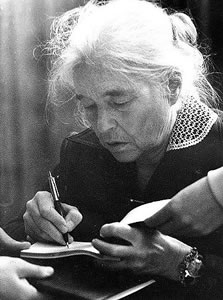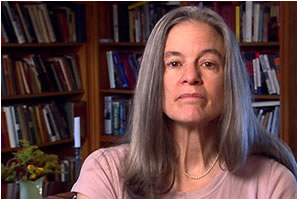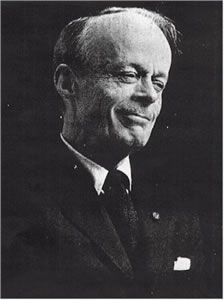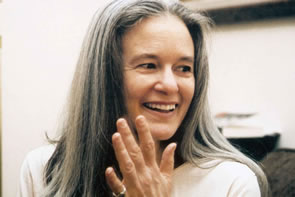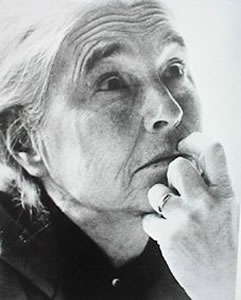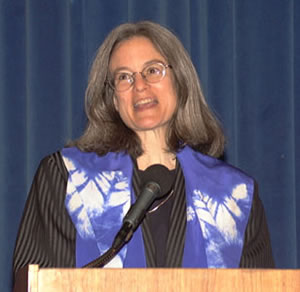De Amerikaanse dichter, librettist en essayist Scott Cairns werd geboren op 19 november 1954 in Tacoma, Washington. Zie ook alle tags voor Scott Cairns op dit blog.
Embalming
You’ll need a corpse, your own or someone else’s.
You’ll need a certain distance; the less you care about
your corpse the better. Light should be
unforgiving, so as to lend a literal
aspect to your project. Flesh should be putty,
each hair of the brows, each lash, a pencil mark.
If the skeleton is intact, its shape may
suggest beginnings of a structure, though even here
modification might occur; heavier
tools are waiting in the drawer, as well as wire,
varied lengths and thicknesses of doweling.
Odd hollows may be filled with bundled towel.
As for the fluids, arrange them on the cart
in a pleasing manner. I prefer we speak
of ointments. This notion of one’s anointing
will help distract you from a simpler story
of your handiwork. Those people in the parlor
made requests, remember? Don’t be concerned.
Whatever this was to them, it is all yours now.
The clay of your creation lies before you,
invites your hand. Becoming anxious? That’s good.
You should be a little anxious. You’re ready.
Hold the knife as you would a quill, hardly at all.
See that first line before you cross it, and draw.
Eremite
—Katounakia, 2007
The cave itself is pleasantly austere,
with little clutter—nothing save
a narrow slab, a threadbare woolen wrap,
and in the chipped-out recess here
three sooty icons lit by oil lamp.
Just beyond the dim cave’s aperture,
a blackened kettle rests among the coals,
whereby, each afternoon, a grip
of wild greens is boiled to a tender mess.
The eremite lies prostrate near
two books—a gospel and the Syrian’s
collected prose—whose pages turn
assisted by a breeze. Besides the thread
of wood smoke rising from the coals,
no other motion takes the eye. The old
man’s face is pressed into the earth,
his body stretched as if to reach ahead.
The pot boils dry. He feeds on what
we do not see, and may be satisfied.

Scott Cairns (Tacoma, 19 november 1954)
De Amerikaanse dichteres Sharon Olds werd geboren op 19 november 1942 in San Francisco. Zie ook alle tags voor Sharon Olds op dit blog.
The Death of Marilyn Monroe
The ambulance men touched her cold
body, lifted it, heavy as iron,
onto the stretcher, tried to close the
mouth, closed the eyes, tied the
arms to the sides, moved a caught
strand of hair, as if it mattered,
saw the shape of her breasts, flattened by
gravity, under the sheet
carried her, as if it were she,
down the steps.
These men were never the same. They went out
afterwards, as they always did,
for a drink or two, but they could not meet
each other’s eyes.
Their lives took
a turn-one had nightmares, strange
pains, impotence, depression. One did not
like his work, his wife looked
different, his kids. Even death
seemed different to him-a place where she
would be waiting,
and one found himself standing at night
in the doorway to a room of sleep, listening to a
woman breathing, just an ordinary
woman
breathing.
Japanese-American Farmhouse, California, 1942
Everything has been taken that anyone
thought worth taking. The stairs are tilted,
scattered with sycamore leaves curled
like ammonites in inland rock.
Wood shows through the paint on the frame
and the door is open–an empty room,
sunlight on the floor. All that is left
on the porch is the hollow cylinder
of an Albert’s Quick Oats cardboard box
and a sewing machine. Its extraterrestrial
head is bowed, its scrolled neck
glistens. I was born, that day, near there,
in wartime, of ignorant people.

Sharon Olds (San Francisco, 19 november 1942)
De Amerikaanse schrijver en literaire biograaf Mark Harris (eig. Mark Harris Finklestein) werd geboren op 19 november 1922 in Mount Vernon, New York. Zie ook alle tags voor Mike Harris op dit blog.
Uit: Bang the Drum Slowly
“It was Joe’s wife later left the cat out of the barn. Usually I do not hang with the coaches much, but me and Joe become fairly friendly on account of Tegwar, The Exciting Game Without Any Rules, T-E-G-W-A-R, which nobody on the club can play but me and Joe because nobody can keep a straight face long enough. I will be hilarious on the inside but with a straight face on the outside, and I was smiling while his phone was ringing while poor Goose’s wife was probably still crying in a dead phone at her end which shows you the kind of a thoughtless personality I have. Joe was out baby-sitting his grandchildren. His wife give me his number, but I did not even take it down. “My Lord,” she said, “Joe has got insurance with 3 or 4 different outfits.” “You do not have insurance,” said I, “unless you have got Arcturus.” She laughed. She asked me how long I planned to be in town, and I said I did not know. There were the pictures of Holly and the pictures of the stewardess curled on the bed plus more pictures now of Joe Jaros baby-sitting his grandchildren, all cozy and warm with a snowstorm outside, not tramping the streets like Goose nor with girls in a number of towns, not drinking up all his credit in the saloons until all of a sudden one day the girls and the credit begin to give out at once. I seen it happen. I seen too many old-time ballplayers hanging around clubhouses telling you what a great game you just pitched (though you might of just got the hell shelled out of you) and could you by any chance loan them 5 to tide them over, which I used to loan them, too, before I was in so damn deep I was playing winter ball and hitting the banquet circuit and still getting in deeper with every passing day until Holly took a hold of things. I said, “Henry, look at Joe. He did not flub his life away chasing after every pair of big white teeth he run across,” and I slid open the door again and circled around and went out a side door saying “Positively No Admission” and listing a number of fines and penalties and prison terms you could get for passing through that one door, and out in the snowstorm and back up in the air.”

Mark Harris (19 november 1922 – 30 mei 2007)
Cover
De Vlaamse dichter, essayist en toneelschrijver Karel van den Oever werd geboren in Antwerpen op 19 november 1879. Zie ook alle tags voor Karel van den Oever op dit blog.
Geloovige Avond
Is de avond oud van tijd
en loom van kreuple uren
(ach, dat geen stuip’ge hekse heur berijd’
en over ’t bezemstoksken naar den Oosten ture)
zie dan hoe zonder orgelronk noch belgerink
het allerstilste Lof begint.
Overal rijst de kranke maan,
sacramenteel geheven,
men blaast de koolge keersen wilder aan:
de starren in den kelderdonkren tochtig beven.
De wolken smeulen zwaar langs ’t wijd verwulf
als wierooksmoor in Sint Gerulf..
De gulden lusters der
gesternten ruchtloos sintlen
de koele en donkre koor uit naamloos ver..
’t Is of hun gouden glimge schaaklen nimmer tinklen.
Die lusters hangen windstil toch uit de oude lucht
vóor iedren Heilge, zonder gerucht..
’t Geboomt der bosschen helt
in ’t schimmrend licht voorover,
’t gestruik hukt in den keersenschijn en kwelt
de sluikge grassen; prevelt iemand in den loover?
De heiplas is een gure kerke-ruit:
de Lofplecht kwijnt er dieper uit.
Als de avond, oud van duur,
vervaakt van zacht vervelen
(ach, dat het groene hostievuur
der ronde maan er eerst tot guldenheid vergele!)
zie dan hoe zonder orgelronk noch belgerink
het allerstilste Lof begint.

Karel van den Oever (19 november 1879 – 6 oktober 1926)
De Amerikaanse dichter Alan Tate werd geboren op 19 november 1899 in de buurt van Winchester, Kentucky. Zie ook alle tags voor Alan Tate op dit blog.
Sonnets Of The Blood
III
Then, brother, you would never think me vain
Or rude, if I should mention dignity;
Think little of it. Dignity’s the stain
Of mortal sin that knows humility.
Let me design the hour when you were born
Since, if that’s vain, it’s only childlike so:
Like an attempting frost on April corn
Considerate death would hardly let you go.
Reckon the cost-if you would validate
Once more our slavery to circumstance
Not by contempt of a prescriptive fate
But in your bearing towards an hour of chance.
It is a part so humble and so proud
You’ll think but little of it in your shroud.
IV
The times have changed. Why do you make a fuss
For privilege when there’s no law of form?
Who of our kin was pusillanimous,
A fine bull galloping into a storm?
Why, none; unless you count it arrogance
To cultivate humility in pride,
To look but casually and half-askance
On boots and spurs that went a devil’s ride.
There was, remember, a Virginian
Who took himself to be brute nature’s law,
Cared little what men thought him, a tall man
Who meditated calmly what he saw
Until he freed his Negroes, lest he be
Too strict with nature and than they less free.

Allen Tate (19 november 1899 – 9 februari 1979)
Cover
De Duitse schrijfster Anna Seghers werd op 19 november 1900 geboren in Mainz als Anna Reiling. Zie ook alle tags voor Anna Seghers op dit blog.
Uit: Das siebte Kreuz
„Mancher hatte bei sich gedacht “Arme Teufel”. Aber man hatte auch bald gedacht, was sie da eigentlich buddelten. Damals war es vorgekommen, dass auch in Liebau ein junger Schiffer offen auf das Lager fluchte. Den hatten sie dann gleich geholt. Er war auf einige Wochen eingesperrt worden, damit er sehen könnte, was drinnen los sei. Als er herauskam, hatte er sonderbar ausgesehen und auf keine Frage geantwortet. Er hatte Arbeit auf einem Schleppkahn gefunden und war später, wie seine Leute erzählten, ganz in Holland geblieben, eine Geschichte, über die das Dorf damals erstaunt war. Einmal waren zwei Dutzend Häftlinge durch Liebau gebracht worden, die waren schon vor der Einlieferung so zugerichtet, dass es den Menschen graute und eine Frau im Dorf offen weinte. Aber am Abend hatte der neue junge Bürgermeister des Dorfs die Frau, die seine Tante war, zu sich bestellt und ihr klargemacht, dass sie mit ihrer Flennerei nicht nur sich selbst, sondern auch ihren Söhnen, die zugleich seine Vettern waren, und ein Vetter war zugleich auch sein Schwager, für ihr Leben lang Schaden zufügte. Überhaupt hatten die jüngeren Leute im Dorf, Burschen um Mädchen, ihren Eltern genau erklären können, warum das Lager da sei und für wen, junge Leute, die immer alles besser wissen wollen – nur dass die Jungen in früheren Zeiten das Gute besser wissen wollten, jetzt aber wussten sie das Böse besser. Da man dann doch nichts gegen das Lager tun konnte, waren allerlei Aufträge auf Gemüse und Gurken gekommen und allerlei nützlicher Verkehr, wie es die Ansammlung und Verpflegung vieler Menschen mit sich bringt.
Doch als gestern früh die Sirenen heulten, als die Posten an allen Strassen aus der Erde wuchsen, als das Gerücht von der Flucht sich verbreitete, als dann mittags im nächsten Dorf ein richtiger Flüchtling gefangen wurde, da war auf einmal das Lager, an das man sich längst gewöhnt hatte, gleichsam neu aufgebaut worden, warum grad hier bei uns? Neue Mauern waren errichtet worden, neue Stacheldrähte gezogen. Jener Trupp Häftlinge, der von der nächsten Bahnstation kürzlich durch die Dorfgasse getrieben wurde, – warum, warum, warum?“

Anna Seghers (19 november 1900 – 1 juni 1983)
Hier met zoontje Peter en dochtertje Ruth rond 1930
De Duitse schrijfster en actrice Christiane Marie Elisabeth “Elise” Bürger, (eig. Hahn) werd geboren op 19 november 1769 in Stuttgart. Zie ook alle tags voor Elise Bürger op dit blog.
Uit: Briefe an Schiller
„Weimar d. 8. Mai 1802.
Wenn ich es wage, ihnen gütiger Mann! die Einlagen zu senden, so ist es Ihr Auge, aus welchem eben so viel Freundlichkeit als Geist leuchtet, welches mich zu der Hofnung berechtigt daß Sie der Durchsicht dieser weiblichen Federprodukte einige geduldvolle Augenblike vergönnen werden.
Ein Fragment aus dem 1. Akt des ersten Teils eines Schauspiels, dessen Stoff interressant genug ist, um etwas daraus hervorzuarbeiten”, wenn anders die Kraft dazu der schwachen Hand, die es unternahm, nicht mislingt. — Dabei habe ich zu fragen: ist in dem Versbau zu viel willkührliches? — muß ich mich fester noch an Regeln binden? — Das zweite Päkchen enthält einige Gedichte, dererlei ich noch mehrere besize; sind sie wohl nicht zu uninterressant um eine kleine Sammlung davon der Lesewelt zu übergeben?) Nur Ihr Unheil soll mich entscheiden. Es kann mich nicht über mich selbst täuschen. ‘Unbekannt mit der Buchhändlerwelt, weis ich nicht, wie man dergleichen Kleinigkeiten Kaufweise verhandelt, noch an welche Buchhändler man sich deshalb am besten und vortheilhaftesten wendet; auch hierüber erbitte ich Ihren Rath. — Sie nicht in Ihren Geschäften zu stören, versage ich es mir Ihnen persönlich nochmals aufzuwarten. Morgen früh 8 Uhr denke ich nach Jena herüber zu reisen, und erwarte meine dortige Aufnahme von Ihrer Güte. Wenn sich die höchste Verehrung mit der reinsten Hochachtung vereint in Worten fühlbar machen könnte, so würden Sie, Vortrefflicher! wissen wie ich mich mit der uneingeschränktesten Ergebenheit nenne, die Ihrige .EIisa Bürger, geb. Hahn“

Elise Bürger (19 november 1769 – 24 november 1833)
De Italiaanse-Albanese dichter en schrijver Girolamo de Rada werd geboren op 19 november 1814 in Macchia Albanese. Zie ook alle tags voor Girolamo de Rada op dit blog.
Donna irene (Fragment)
There arrived a boat from the midst of the sea,
Arrived at the port of Cotrone
Of the ladies from Cotrone
Not a single one went down to it;
But for one, Lady Irena.
“Hello, Sailors!” “
Be welcome, Lady Irena!”
“Where do you have silken goods?”
“Step on board, Lady, onto the deck.”
The Lady selected a gown
For her sister-in-law’s wedding,
She selected it and put it into the hands
Of the servant, the maid.
And the sailors set off
And drifted away gently and slowly.
By the time she noticed this,
They were far out to see.
Vertaald door Jason Blake

Girolamo de Rada (19 november 1814 – 28 februari 1903)
Borstbeeld in Macchia Albanese.
Onafhankelijk van geboortedata:
De Duitse schrijfster Veronika Aydin werd in 1961 in Emmerich geboren. Zie ook alle tags voor Veronika Aydin op dit blog.
Uit: Bestattungsfragen. Elfriedes zweiter Fall
„Elfriede ließ vor Schreck die Rechnung aus der Hand fallen. Das Geräusch klang, als würde jemand durch eine rostige Gießkanne Luft einsaugen. Mühsam und um sein Leben ringend. Und ganz in ihrer Nähe. Erschrocken schaute sie unter den Schreibtisch. Hugo lag auf der Seite, seine Rippen unter dem schwarz-braunen Fell hoben und senkten sich bedrohlich. »Du liebe Güte«, dachte Elfriede, »können sich Hunde auch erkälten? Und das mitten im Sommer?« Das Tier keuchte zum Gotterbarmen. Sie stopfte die Rechnungen zurück in die Schublade und beugte sich zu dem Hund hinunter. Was fehlte ihm bloß? Hugo sah sie aus seinen braunen Augen leidend an. Elfriedes Herz schmolz. Es war nicht Liebe auf den ersten Blick gewesen. Als Oliver den kurzbeinigen Sennenhund nach Hause brachte, hatte Elfriede es entschieden abgelehnt, ihm Asyl zu gewähren. Eine Detektivin war schließlich viel unterwegs und gerade erst hatte sie sich ein kleines Büro in der Hofheimer Altstadt eingerichtet, mit schicken Möbeln und einem neuen weißen Teppichboden. »Es ist doch nur für sechs Wochen, Mama«, hatte ihr Sohn gebettelt, »nur solange Leander in den Sommerferien in Kur ist.« »Nein! Kann der Hund nicht in eine Tierpension?« »Er braucht Menschen um sich. Leanders Mutter muss den ganzen Tag im Supermarkt arbeiten und den Vater sieht er kaum. Das Futter hat Leander mir gleich mitgegeben«, versuchte Oliver Einwände finanzieller Art zu entkräften. »Und ich geh auch jeden Tag mit ihm spazieren.« »Ich glaub dir kein Wort!«
Es war wieder mal Tante Ingeborg, die mit einem »Meinst du nicht, es könnte ihm guttun«-Blick der Situation eine Wende gegeben hatte. Der Junge hat es nicht leicht, schien dieser Blick zu sagen, jetzt, wo seine kleine Schwester auf der Welt ist. Gönn ihm doch das bisschen Freude! Nun, es kam, wie Elfriede es vorausgesehen hatte. Der Nach- wuchs ihres Ex-Mannes mit seiner neuen Lebensgefährtin änderte nichts daran, dass alle Hundespaziergänge an ihr hängenblieben.“

Veronika Aydin (Emmerich, 1961)
Hier met collega schrijfster Kerstin Klamroth (links)
Zie voor nog meer schrijvers van de 19e november ook mijn blog van 19 november 2017 deel 2.







